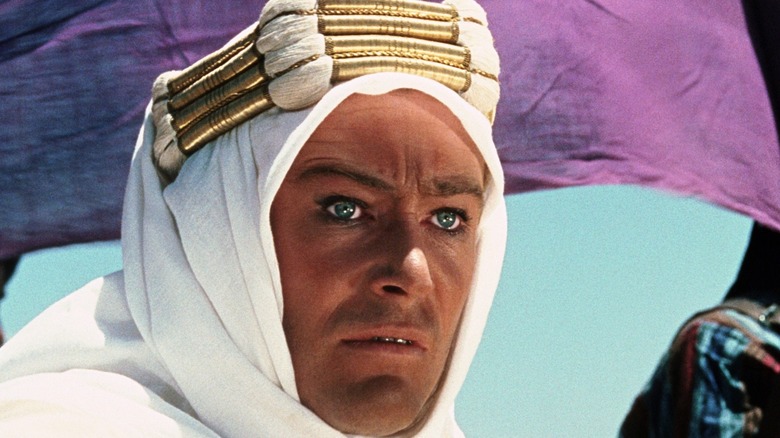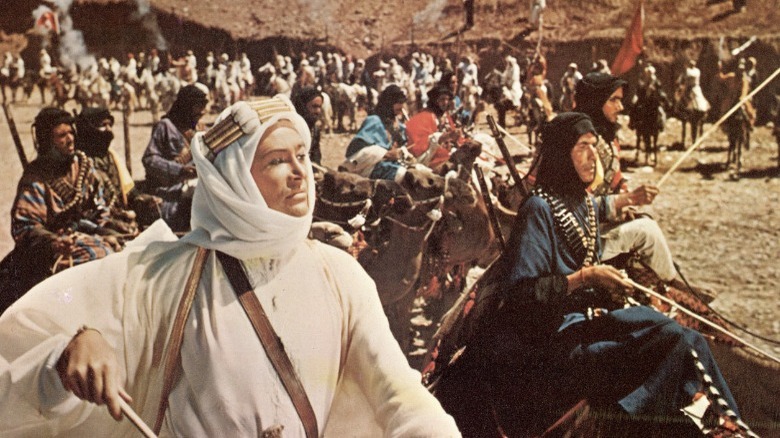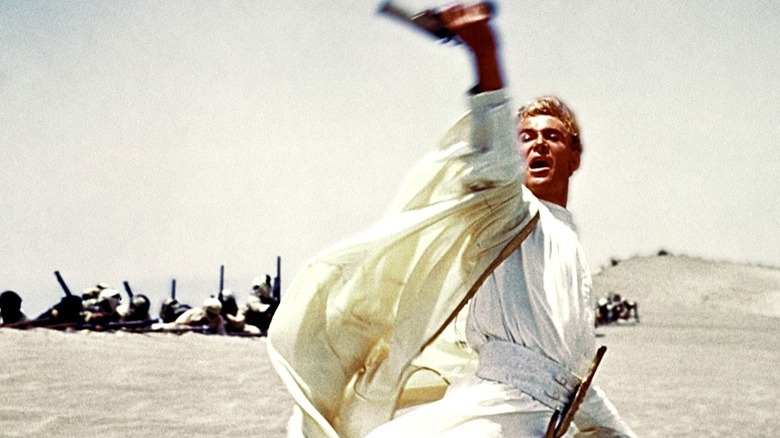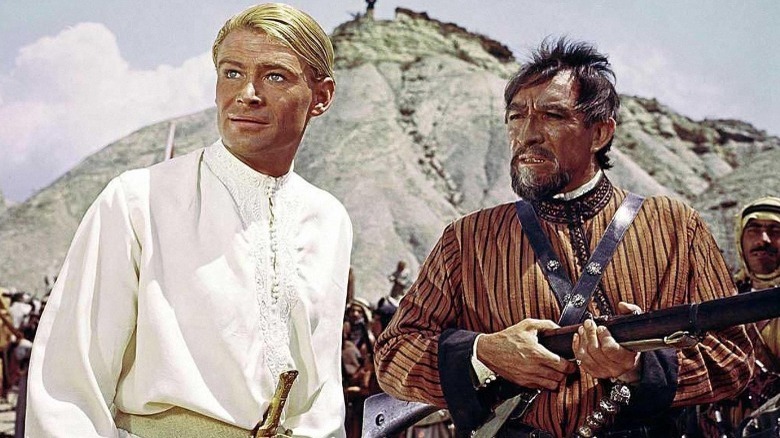Hollywood Tried To Erase Lawrence Of Arabia's Writer From History
"Lawrence of Arabia" defined what an epic looked like on the big screen. Its exploration of how historical figures and events can become cultural myths — as well as its huge-scale, immersive Panavision 70 mm color cinematography — influenced filmmakers from George Lucas to Denis Villeneuve. That's why Hollywood's decades-long neglect of screenwriter Michael Wilson is an uncomfortable stain on the film's prestigious status in the annals of cinema.
Sam Spiegel was the lucky producer who managed to negotiate the much-coveted and much-protected rights to T.E. Lawrence's autobiography "Seven Pillars of Wisdom," which told of the British colonel's experiences in the Arab Revolt against the Ottoman Empire during WWI. Wilson, clearly devoted to the material, wrote a treatment in 1958 entitled "Lawrence of Arabia: Elements and Facets of a Theme." Instead of merely summarizing the story, the treatment analyzed the way Western media portrayed Lawrence and broke down the differences between the real-life man and the modern myth. Wilson's complex view on the subject matter informed the structure of his screenplay, which established Lawrence's heroic rise before showing the cracks in his image.
A Fraught Relationship
Both Wilson and director David Lean, who had worked together with Spiegel on "The Bridge on the River Kwai," agreed that the film shouldn't be a typical Hollywood romanticization of a war hero. However, Lean saw Wilson's account as an overly academic story, which included tertiary characters and specific political events that distracted from the personal characterization of Lawrence.
After writing three drafts, Wilson quit the production out of frustration. Robert Bolt, who replaced Wilson and who re-wrote the dialogue and condensed groups of side characters into individual representations, was originally solely credited with writing the screenplay for "Lawrence of Arabia." However, it was Wilson who established the main story structure, character arcs, and themes. In a letter that Wilson sent to Bolt in 1962 that was cited by The New York Times, the screenwriter said, "If I were 'clean,' my name would already be alongside yours as co-author of this picture."
Wilson is, of course, referring to the root cause of his lack of credit: his position on the dreaded Hollywood blacklist.
The Blacklist Curse
The entertainment industry was one of the primary targets of the House Un-American Committee (HUAC), the government organization tasked with investigating subversive (read: Communist) activity within the United States. As America's most prominent cultural institution, Hollywood was a particularly hot target for HUAC during the Red Scare since, theoretically, Communist filmmakers could spread their ideologies through the movies they made. The blacklist era truly started when a group of mostly screenwriters (with two directors) refused to testify before HUAC in an October 1947 hearing. Known as the "Hollywood Ten," the group served prison sentences and operated under pseudonyms in order to salvage what remained of their now-poisoned careers.
Michael Wilson wasn't part of the Hollywood Ten, but he was one of the many industry creatives who were blacklisted afterward. He had, in fact, been writing scripts while hiding his identity before working on "Lawrence of Arabia." His screenplays were uncredited at the time, and in the case of "The Bridge on the River Kwai," final credit was given to Pierre Boulle, the French novelist whose work the movie was adapted from, but who could not speak or write English.
The Grudge
"Lawrence of Arabia" seemed to hold a particularly bitter place in Wilson's heart due to years of his former collaborators denying that he had actually contributed anything, even after the era of the blacklist was over. Although the Writers' Guild started identifying blacklisted writers and awarded Wilson and Foreman their due credit for "The Bridge on the River Kwai" in 1984, it wasn't until more than ten years later in 1995 that the organization finally acknowledged Wilson's contribution to "Lawrence of Arabia." Wilson, Bolt, Lean, and Spiegel had all already died.
In many ways, the uneasy relationship between the Screen Writers' Guild union and Hollywood studios strengthened the battle between Hollywood screenwriters and HUAC. Sam Spiegel seemed to have no protests about working with Michael Wilson before and never tried to expose him or other creatives, but that didn't mean that he could freely deny giving due credit to the screenwriter he originally hired for his biggest production. The Hollywood blacklist denied Wilson credit upon the release of "Lawrence of Arabia," but the conflict between screenwriter and producer helped hide Wilson's name from one of the most influential movies in Hollywood history for decades afterward.



